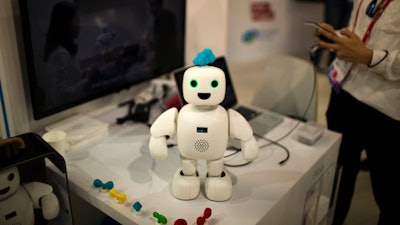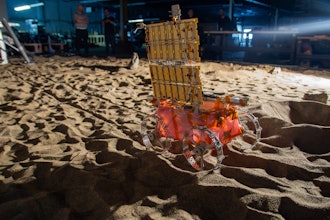
BARCELONA, Spain (AP) — While smartphones get top billing at the Mobile World Congress in Barcelona, Spain, it's the quirky, under-the-radar products that are getting a lot of the visitors' attention (view photos in gallery).
Here's a glimpse of some of the gadgets and apps displayed by start-up companies this week at the fair, the world's largest for wireless technology.
Robot Feelings
Living in Seoul, Jong-Gun Park looked around him one day and decided his fellow South Koreans needed some help expressing their emotions.
"We are so busy these days, always running to and from work, taking our kids to school, studying, that we no longer find the necessary time to interact with each other," said Park, CEO of the company Circulus.
Enter Pibo, the friendly dinner table ice-breaker.
Pibo is a charming little robot whose goal is to get you and your loved ones sharing your daily life more. "Are you tired?" he asks, "I will play music without boredom."
Sure, he still needs to hone his English, but he's always eager to ask about your day or provide updates on weather conditions.
Still a prototype, Pibo comes in a case, should you wish to take him along on vacation. He is, after all, a member of the family. For an expected $490 a pop.
Little Greenhouse
Growing your own veggies may become possible even for urbanites with tiny studio apartments.
Israeli startup Living Box offers a modular, unfoldable, solar-powered little greenhouse that you can use to harvest anything from tomatoes to tea and herbs.
"We have a slow release water system for irrigation, with a novel liquid nutrient solution and bacteria to avoid the use of pesticides, as well as an app prototype updating weather conditions and other relevant data right to your smartphone, so you don't have to monitor it," explained Nitzan Solan, CEO of the company.
The idea was to create a sustainable, affordable and simple mobile farming system that could be operated by anyone around the globe.
As of now, Living Box is testing in 50 sites around Israel, the U.S. and Nigeria, and aims to try locations in Spain and Fiji. It is expected to carry a market price of $300.
Metal Percussion Instrument
The hang, a metal percussion instrument shaped like a flying saucer, is beloved of street performers the world round and often associated with meditation practices like yoga. Now it comes in a fully digital version.
When delicately tapped, the Oval can reproduce the sounds of a hang as well as other instruments, like drums, trumpets and even violins.
Musicians Ravid Goldschmidt and Alex Posada, the co-founders of the Spanish startup that makes the Oval, say they sought to start a "revolution of percussion" with this instrument.
Already on the market, the Oval is aimed at all kinds of consumers, with about 40 percent estimated to be amateur or professional musicians.
It goes for about $950.
Blind Headset
Samsung's Relumino headset aims to do nothing less than help the blind see.
The gadget, shaped like virtual reality glasses, recasts images of the world in a way that someone with vision problems can see more clearly.
The glasses are still in a developmental stage and, although it's still too early to venture a market price for them, Samsung Senior Engineer Junghoon Cho hopes to compete with other more expensive visual aids out there.
Besides correcting blurred images, the headset can eliminate blind spots and improve peripheral vision.
"If we make our own project, people who are visually impaired can walk outside using our glasses... We want to help them have a better social relationship with other people," said Cho.
Shopping Vision
Worried the new couch might not squeeze through door?
Sri Lanka-based startup Liveroom is trying to solve your angst. Its virtual reality technology aims to give shoppers a live look at how products in online stores would fit into your home.
This is how it works: you shoot an image of the space in question via a liveview button and then consult their catalog on the app for the item you want. The item will pop up on your tablet or smartphone set in the image of your home. You can move and rotate the item and change its colors, fabric and material.
"If you're buying online, via e-commerce, you have only images. You have to visualize the product in your mind and maybe the dimensions and the colors are wrong," said founder and CTO Sameera Nilupul. "With this technology, you can see exactly how the products look in your own home."






















